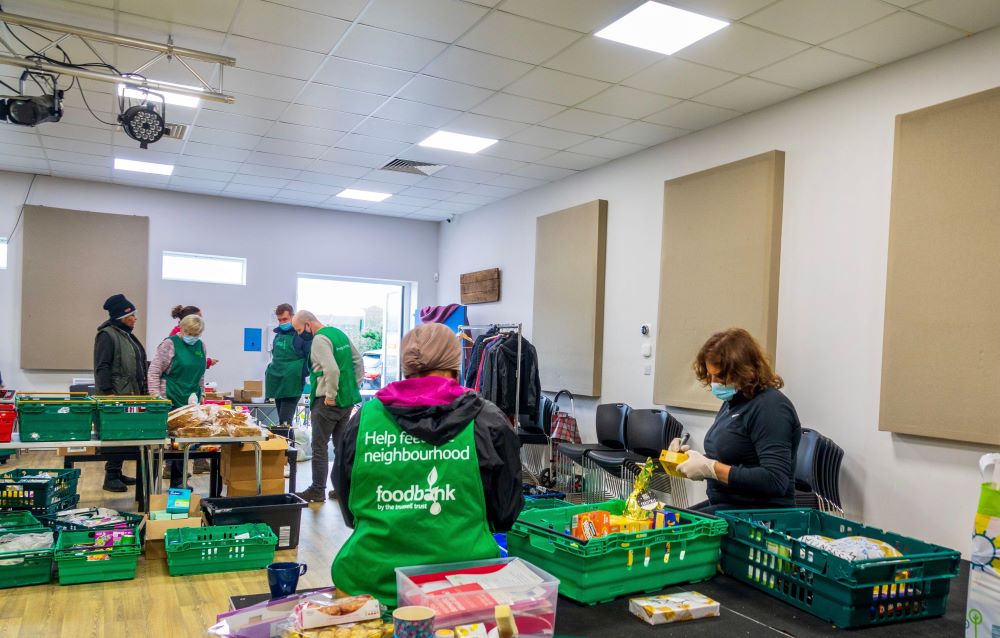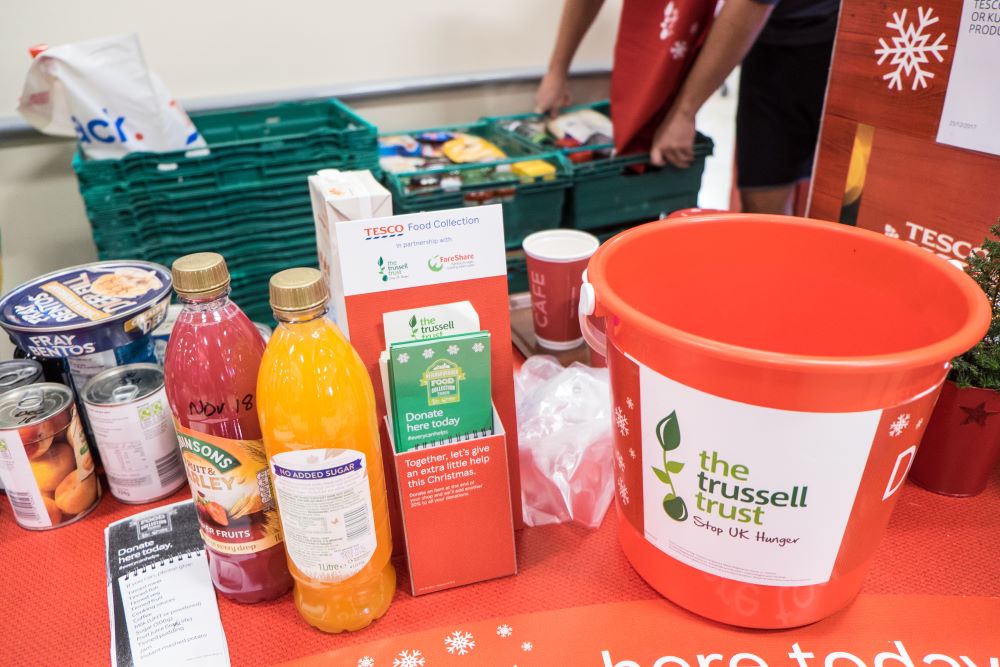Government Warned Food Banks Are Now Ingrained In British Life
The latest data from the Trussell Trust showed food bank usage has increased by 16 per cent. (Alamy)
5 min read
Chief executive of the Trussell Trust, Emma Revie, has told PoliticsHome the charity's food banks are at "breaking point" and expressed concern that they were becoming permanent fixtures in British society.
Figures released by the Trussell Trust in November showed 1.5m emergency food parcels were handed out by the charity between April and September across the UK, the highest figure ever and a 16 per cent increase on the same period last year.
Data also shows 65 per cent of all the parcels provided by Trussell Trust food banks in the same period were for families with children. The charity has found 320,000 people have used a food bank for the first time in the six months to November 2023.
"People don't have enough money for the essentials," Revie said.
"The level of social security is just not enough to cover those core essentials that we all need to live – for people who are working, and potentially receiving some universal credit on top of that."
Revie said the food bank is also having to diversify what it offers to meet the demands of its clients, including providing SIM cards and hot water bottles – leaving the organisation feeling as though a reliance on their services has become entrenched in British society.
"Food banks are not a statutory service, they can't be," Revie continued.
"They're doing their very, very best, but creaking under the strain. We are starting to think in our minds as a nation, that the service will always be there and able to just adapt, and partly that is just down to the extreme, extraordinary commitment of our volunteers.
"But on the inside it doesn't feel like that – it feels like a group of people carrying too much on their shoulders. It's unsustainable, and it's not right."
Labour MP Stephen Timms, chair of the cross-party work and pensions committee, said food banks are at "clear danger" of being "institutionalised" in the UK and expressed concern about the rise in demand.
 "In some parts of Europe they are institutionalised and arguably now, after 15 years, they are here as well," Timms said.
"In some parts of Europe they are institutionalised and arguably now, after 15 years, they are here as well," Timms said.
"But I do think we have to keep alive the hope that people should not have to, as the Prime Minister said, depend on food banks.
"But we are becoming very dependent on food banks, and it's taken as part of the system – and it shouldn't be."
Timms asked Prime Minister Rishi Sunak about his comments made last year about food banks at the recent liaison committee hearing, and raised concerns about the rise in demand since he was last asked about the issue by MPs.
"As I have consistently said, you would prefer for people not to have to use food banks, but as I have said previously as well, I am grateful to all those people who are involved in providing them, because they provide support to people," Sunak said in response.
"We can continue to lift people out of poverty, improve their incomes and then support families with food costs, as we do, through things like the holiday activities and food programme."
But Revie insisted that social security measures were still inadequate, and without increases to benefits, people would continue to rely on food banks.
"Our main ask of Government is to deliver that fundamental assumption one should be able to make about social security: that it's covering essentials," she said. "At the moment, it is not is not protecting people from going without."
While Revie said she welcomed some measures by Government including cost of living payments, and additional disability living payments, she believed there was a tendency to only offer short term solutions.
"They've just not been sufficient, just not enough to protect those on the lowest incomes from going without the essential items," she added.
Timms told PoliticsHome rising rents and general cost of living rises coupled with rent rises and benefits failing to keep up is leaving people facing "real pressure", and agreed with the claims that social security remains too low to protect people from needing food banks.
"The basic minimum, what is required to support an individual or a family, and how much it costs... [is] still significantly above the headline rate of Universal Credit," he said.
 "As a proportion of average earnings, it's probably the lowest it's ever been – and continuing to fall. It's just too low now to do the job which everybody agrees social security is there to do: enabling people to support themselves."
"As a proportion of average earnings, it's probably the lowest it's ever been – and continuing to fall. It's just too low now to do the job which everybody agrees social security is there to do: enabling people to support themselves."
Revie said she feared food banks could become a political football in 2024 given its an election year, and called on politicians of all stripes to resist politicising the "catastrophe" of food bank usage.
"What we need to move past is this being viewed in any way as a partisan issue," she said.
"It's affecting us all – because we're living in a society where people aren't able to afford enough afford food – so we need Westminster coming together and saying: 'actually, for none of us on either side of the House is this okay, and how can we agree together on policies that will provide that safety net at a level under which our citizens will not be allowed to fall at any point?'"
Shadow work and pensions minister Alison McGovern told PoliticsHome the levels of destitution in the UK were currently "shameful".
"Under the Tories, it's people's bills that have grown rather than the economy, and low paid workers are finding it harder to make ends meet when only 1 in 6 ever truly escapes low pay," said McGovern.
"Labour will grow the economy, fix the NHS, and reform employment support, so people can move on and move up into well paid jobs created in all parts of the country.
"The last Labour government lifted a million children out of poverty, only the Labour Party can be trusted to tackle destitution."
A government spokesperson said: “We are committed to supporting the most vulnerable, which is why the £104 billion cost of living package, worth around £3,700 per household, will include a 6.7 per cent increase to benefits next year and the Household Support Fund is helping people with the cost of essentials.
“We have also halved inflation to help everyone’s money go further and cut taxes at the Autumn Statement – saving the average earner £450 a year.”
